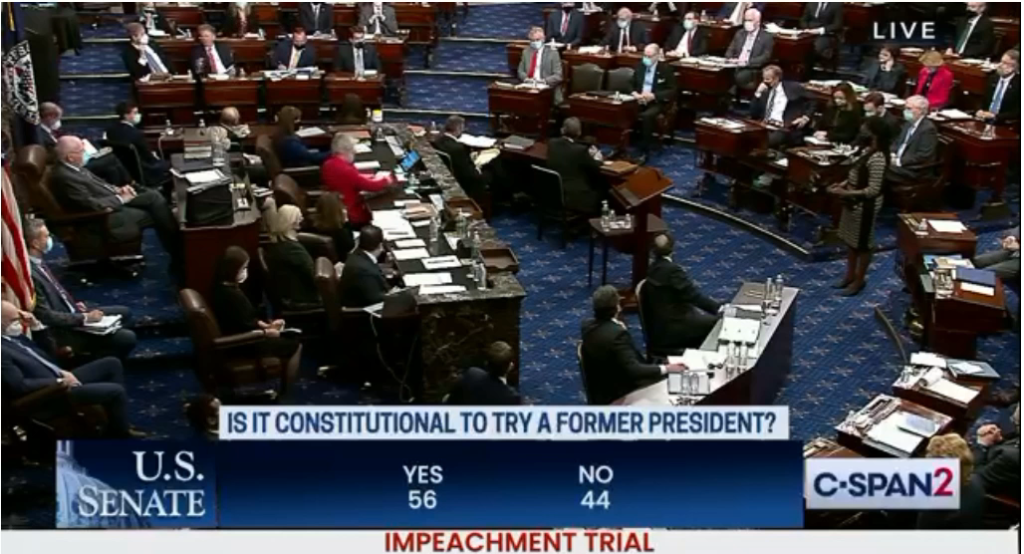
The U.S. Senate voted 56 to 44 that it is, in fact, Constitutional to try Trump or a former President for Impeachment.
Trump’s second Impeachment Trial resumes Wednesday, February 10 at 12 noon ET on C-SPAN-Live. During the Impeachment Trial, U.S. Senate members will vote to convict or acquit Donald John Trump of inciting the insurrection that took place on January 6, 2021, against the U.S. Capitol by pro-Trump supporters. The vote will also suffice to disqualify Trump from ‘‘hold[ing] any office . . .under the United States.’’
Trump Lawyers Losing Argument
Trump Lawyers losing argument that proceeding with an Impeachment is unconstitutional because their client is no longer the President was evident to anyone watching the Impeachment Trial, that they did not have a leg to stand on with this weak summation.
As the specific topic of discussion and the Senate vote was whether or not a former President could be tried for Impeachment, one would think a team of lawyers representing a former President would be better prepared. But, their challenge wasn’t a matter of being prepared. Rather, unfortunate for them, there was simply no sufficient argument for support of their claim within the Constitution or prior precedents. Conversely, the representatives arguing that Impeachment of a former President was Constitutional offered a plethora of prior precedents, and masterfully cited the intent of the Constitution in a way that was logical and therefore, easy to understand.
Message Mishap
The not mutually exclusive message mishap that was inferred by Trump Lawyers, made their Constitutional argument actually work against them. In the case of Trump, he was Impeached for ‘Inciting An Insurrection’ while he was the President of the United States. The Constitutional quotes from his Attorneys consistently cited the process to ‘Impeach and Convict’ as it related to a sitting President. This point of reference would surmise, these actions for the Impeachment of a former President should also apply. Unfortunately, their argument would suggest the actions to ‘Impeach and Convict’ are not mutually exclusive. If they are not mutually exclusive, that means they must happen in tandem with one another, and if they don’t, it deems their argument irrelevant.
If the act or process to ‘Impeach and Convict’ is mutually exclusive, by this logic, the inference is any independent action, i.e. Impeachment or crime occurred before a President leaves the office and the duties of the Presidency, trial to occur after he leaves office, thus separating the action and making the argument irrelevant.
In short, in their argument, you cannot ‘Impeach and Convict‘ a former President. But, if you were already Impeached for crimes as a sitting President, the vote to convict is simply a formality. Unless there is a time limit set forth in the Constitution, which there is not, for when a conviction must take place after Articles of Impeachment have been presented, then it infers, not only is there no time limit to convict, but there is no consideration given as to whether or not the Impeachment Trials cannot continue once a U.S. President is out of office.
Excerpt–Feb 9th Impeachment Trial Post dated February 9, 2021
The Articles Of Impeachment are specific to “Impeachment for, and Conviction of, Treason, Bribery, or other high Crimes and Misdemeanors,’’ that occurred while Trump was a sitting and acting President. Therefore, the timeline it takes to complete the Impeachment Trial has no barring on the fact that Trump is no longer in office serving as President.
ExpressYourselfBlog, Creative Commentary

